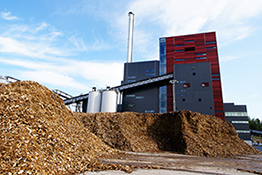Biomass

Moisture Control for Biomass
The biomass industry has grown in recent years and, with it, the need for moisture measurement and control sensors such as the NIR 7000 also grew. Dry biomass is ideally suited to burn at higher temperatures and delivers greater thermal efficiency.
Biomass Combustion
The greater the moisture content of the biomass the greater the required energy for combustion. The required energy for combustion is directly related to boiler efficiency. Moisture in biomass must first be driven out of the biomass prior to combustion where carbon dioxide, water vapor and, ultimately, heat, power and energy are produced. Sensortech instruments help to maintain the necessary target moisture range of biomass for optimum boiler efficiency.

Drying Biomass
Reducing the moisture content of biomass is a primary consideration to improve combustion efficiency and control. Reduction of moisture content dramatically increases power in relation to the weight of the biomass. The drying process of biomass to a target moisture range must first consider the starting moisture range of the incoming biomass; this is true of all feedstocks.
Moisture Consistency
To maintain a consistent target moisture range at the output of the dryer, prior to entering the pellet mill, a Sensortech moisture analyzer should be place before and after the dryer. Both the incoming and exiting moisture of the biomass provides data essential to controlling your rotary drum, conveyor belt, flash, cascade or bed/grate dryer.
IR Moisture Control
The NIR 7000 Series analyzer provides the biomass industry with an effective process management and control tool. Sensortech’s NIR 7000 Series instruments combine state of the art IR technology for precision moisture measurement and control with industrially rugged construction. These advances enable the biomass industry to cut costs and improve quality while enhancing eco-friendly objectives. The NIR 7000 helps to promote a sustainable environment by reducing energy costs and product waste while improving product quality.
More topical information:
- Video – Real-Time Moisture Control for Biomass – Wood Chips
- Moisture Measurement in Irregularly Shaped Product Types
- Managing Moisture with Irregularly Shaped Product
- Moisture Control for Pellet Product Types
